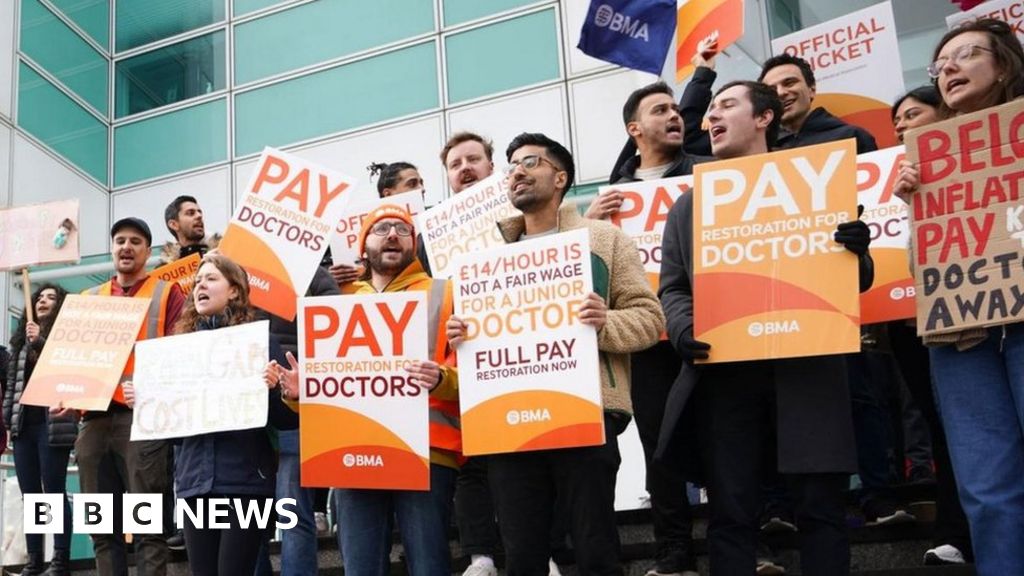Pay Rises Above Inflation Would Be A Terrible Mistake, Says Hunt

The chancellor has said it would be a "terrible mistake" to give pay rises above the rate of inflation, even though strikes are hitting the economy.
Jeremy Hunt said the impact of the junior doctors' strike on NHS patients was "regrettable".
But wage increases that fuelled inflation would have a "more damaging" impact on the UK economy, he said.
Junior doctors are calling for a 35% pay rise, to make up for 15 years of below-inflation wage rises.
There has been no breakthrough in the latest public sector strike. The government has said that junior doctors' pay demands are "unreasonable" and that talks can only happen if the BMA union moves "significantly" away from their current position.
Speaking on the sidelines of the International Monetary Fund (IMF) spring meetings in Washington DC, Mr Hunt said agreeing pay awards without making inflation worse was an "incredibly difficult balancing act that we have to get right".
Inflation, which is the rate prices rise at, is currently near a 40-year high in the UK. Prices in February were 10.4% higher than they were in the same month a year earlier.
That has prompted workers in many sectors to call for higher wages, bringing a wave of strikes. Official figures revealed industrial action held back economic growth in February.
But Mr Hunt told the BBC the government's aim was to "put this high inflation period behind us".
He said if the government stuck to its plans inflation could be brought below 3% by the end of the year.
"The worst possible thing that we can do for junior doctors, nurses, train drivers, teachers is to manage the economy in a way that they are still worried about 10% cost of living increases, in a year's time," he added.
Though the government has pledged to cut inflation, many economists have said that inflation is due to fall naturally in the coming months, as a result of energy prices falling.When asked about the junior doctors' pay demands, the chancellor pointed out that when nurses, who started out asking for a 19% rise, publicly committed to a much lower number "that became the basis of a fruitful discussion".
Following an IMF forecast suggesting that the UK would be one of the worst performing major economies in the world this year, Mr Hunt hit back, saying that the IMF had "undershot on the British economy for quite a long time".
The IMF now believed the British economy was "on the right track", he added, and had praised his recent Budget.
Other G7 finance ministers at the Washington gathering warmly welcomed what they saw as a remarkable change in tone and engagement from the UK, from the last set of IMF meetings, which occurred in the middle of the mini-Budget crisis, under the previous chancellor Kwasi Kwarteng.
From Chip War To Cloud War: The Next Frontier In Global Tech Competition
The global chip war, characterized by intense competition among nations and corporations for supremacy in semiconductor ... Read more
The High Stakes Of Tech Regulation: Security Risks And Market Dynamics
The influence of tech giants in the global economy continues to grow, raising crucial questions about how to balance sec... Read more
The Tyranny Of Instagram Interiors: Why It's Time To Break Free From Algorithm-Driven Aesthetics
Instagram has become a dominant force in shaping interior design trends, offering a seemingly endless stream of inspirat... Read more
The Data Crunch In AI: Strategies For Sustainability
Exploring solutions to the imminent exhaustion of internet data for AI training.As the artificial intelligence (AI) indu... Read more
Google Abandons Four-Year Effort To Remove Cookies From Chrome Browser
After four years of dedicated effort, Google has decided to abandon its plan to remove third-party cookies from its Chro... Read more
LinkedIn Embraces AI And Gamification To Drive User Engagement And Revenue
In an effort to tackle slowing revenue growth and enhance user engagement, LinkedIn is turning to artificial intelligenc... Read more

